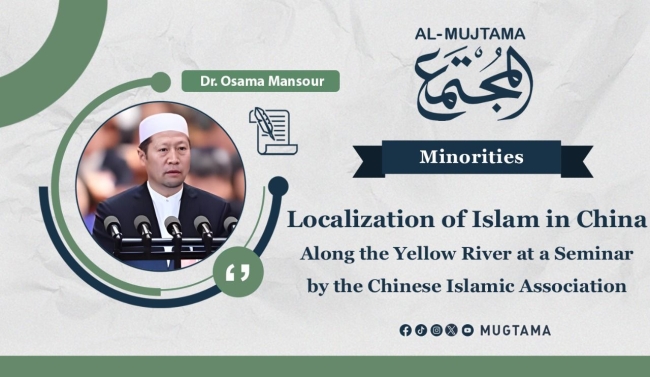Localization of Islam in China Along the Yellow River at a Seminar by the Chinese Islamic Association Featured
At the beginning of this week, a seminar titled "Serving the Strategic Yellow River in the Capitals of 9 Provinces and Regions Along the Yellow River" was held in Jinan, the capital of Shandong Province in eastern China. The cities involved included Jinan (Shandong's capital), Taiyuan (Shanxi's capital), Hohhot (Inner Mongolia), Zhengzhou (Henan), Chengdu (Sichuan), Xi'an (Shaanxi), Lanzhou (Gansu), Xining (Qinghai), and Yinchuan (Ningxia), encompassing provinces and regions situated along the Yellow River from the far northwest to eastern China.
The seminar was attended by Ma Zhongbing, Vice President and Secretary-General of the Chinese Islamic Association, Ma Yinbing, President of the Islamic Association of Shandong Province, Cao Jinbing, Director of the Ethnic and Religious Affairs Committee of Shandong Province, and Ma Baoling, a member of the Standing Committee of the Jinan Municipal Party Committee.
Vice President and Secretary-General Ma Zhongbing expressed his congratulations on this occasion, stating that holding a seminar on the relationship and convergence between Islam and Confucianism in the capitals of nine provinces along the Yellow River is a translation of the recommendations made during the third plenary session of the 20th Central Committee of the Communist Party, aimed at systematically enhancing the relationship between Islam, the Party, and Confucianism in our country.
He mentioned that the idea of the relationship between Islam and Confucianism is a successful practice of traditional Chinese culture, and represents an ideal model for the deep integration of different civilizations. It also embodies the humanistic character of openness and inclusiveness, spiritual values of friendly exchanges, and the tireless pursuit of love and harmony among the people of one homeland.
He proposed the necessity to clarify the value of Islamic-Confucian exchanges in Shandong, to fully harness the advantages of these exchanges, to continue and deepen their practice, and to enhance the understanding of the Islamic community and the broad masses of Muslims in our country towards the great motherland, the Chinese nation, and Chinese culture. He emphasized aligning with the Communist Party of China and socialism with Chinese characteristics, developing and practicing core socialist values, cultivating a strong sense of the Chinese national community, and promoting a moderate Sinicization of Islam in our country, while continuing to enhance the adaptation of Islam to socialist society.
For his part, Director Cao Jinbing stated in his speech that Shandong Province adheres to the principle of "maintaining unity and empowering experience," focusing on promoting the unified management of Islamic affairs, implementing new practices for the Sinicization of Islam, and enhancing the construction of Islamic communities. To achieve this, four proposals were put forward:
First: Strengthening cooperation and exchanges to develop the talents of Islamic and Confucian scholars.
Second: Enhancing mutually beneficial cooperation in the field of relevant religious administration.
Third: Developing scientific and academic research between both sides.
Fourth: Promoting exchanges and integration among different nationalities and ethnic minorities.
In the meeting, Islamic associations in the capitals of the nine provinces and regions jointly issued a proposal to systematically promote the Sinicization of Islam, without excess or negligence, calling for efforts to be a strong supporter of the awareness of the Chinese national community, striving to build modernization in the Chinese style, and making a positive contribution to the Islamic community in promoting high-quality sustainable development along the Yellow River.
During the seminar, Zhang Chi Gang, a professor of philosophy and religious studies at Peking University, Li Lin, director of the Islamic Research Office at the Institute of World Religions of the Chinese Academy of Social Sciences, and Ji Fang Tong, a professor of social sciences at the same institute, along with some professors from Nanjing University of Science and Technology and Chufu Normal University, delivered key presentations at the seminar.
During the discussion session, the participating experts and scholars emphasized the necessity of deepening the relationship between Islam and Confucianism in a manner that does not violate the law or contradict Islamic teachings and principles.
More than 70 experts and scholars from universities and research institutions, including Peking University, the Chinese Academy of Social Sciences, the Religious Research Center of the Central Committee of the Communist Party, Qinghai University for Nationalities, Nanjing University of Science and Technology, and Confucius Institutes participated in this seminar, including representatives from Islamic circles in the capitals of the nine provinces along the Yellow River, comrades responsible for relevant business departments in the United Front (religious) Administrations of the provinces and municipalities, those responsible for Islamic associations in the provinces and municipalities, and representatives from Islamic circles.


